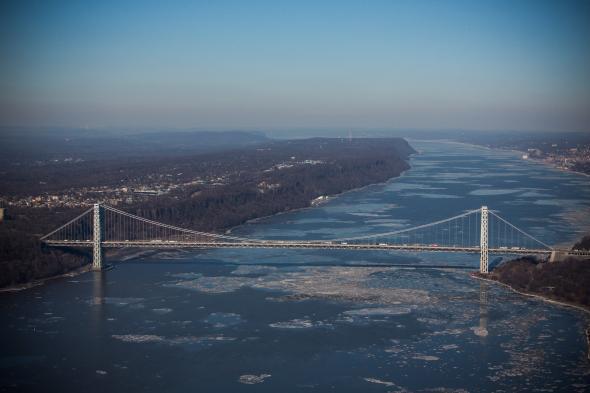This post originally appeared in Business Insider.
FORT LEE, N.J.— Every day is usually the same for Young Ok, a school crossing guard who directs traffic at the intersection of Main Street and Palisade Avenue in the small town of Fort Lee, N.J.
He works from 9 a.m. to 2 p.m., then comes back out a little after 2:30 p.m. for the rest of his shift. Usually, the afternoon traffic is better than the morning. The intersection at which he works is a couple of blocks away from the entrance onto the George Washington Bridge, the lifeblood of a community that often goes into and out of New York City.
But one day in September, the traffic never stopped. It was constant, starting with the beginning of his shift and lasting until the end. He came back out at 2:30 and thought, “How?!”
Now he knows how, from watching television and reading the newspapers over the past week. Two of the town’s three access lanes onto the George Washington Bridge were closed for four days in September, a decision that had extensive input from top aides of the administration of New Jersey Gov. Chris Christie.
The scandal has cast a shadow on the image of Christie, who before this was revered within the Republican Party after a landslide re-election victory in November.
Christie apologized for the closures in a lengthy press conference last week. And he even made a trip up to Fort Lee to meet with and apologize to Mayor Mark Sokolich, a Democrat whose refusal to endorse Christie for re-election has been speculated to be the motivation for the closures as political retribution.
Fort Lee’s main roads lead to the George Washington Bridge. At its quietest, a trip over the bridge into Manhattan takes only 15-20 minutes, making Fort Lee an ideal spot for all kinds of commuters, from professionals and students to those making the occasional trip to Yankees games.
Hicham Alnach, a doctor in Manhattan, was one of the commuters stuck in the traffic. In an interview with Business Insider Monday, he said that because there was no advance warning of the impending traffic jam, he initially feared that there had been a terrorist attack that had shut down the bridge. It took him more than two hours to get to work that first day.
When he found himself stuck in a logjam for the second consecutive day, he became furious. He called Fort Lee police, the Port Authority, and even tried calling someone in the governor’s office. He kept getting the same non-answer.
“I was going to go to the media. I wanted to go to the White House,” said Alnach, who added that he recently purchased a home in Fort Lee for a “substantial” amount (he did not want the exact value of his house or his place of work to be published).
Stories like Alnach’s are familiar in Fort Lee. Ila Kasofsky, a longtime member of the borough’s council, relayed two such stories to Business Insider. One involved a constituent who was delayed more than three hours in traveling to get a stem-cell transplant at New York University.
Kasofsky also told the story of Jason Blatter, a constituent who needs a kidney transplant and was at NYU for a check-up. Blatter, in his 40s, has already undergone two heart transplants. His parents were delayed, similarly, more than two hours in accompanying him on his doctor’s appointment.
Some of these hardships are at the heart of a class-action complaint that was filed last Thursday, the day after new revelations tied the Christie administration to the lane closures.
“If there’s a backup on the Cross-Bronx [Expressway],” Kasofsky said of a road that connects to the George Washington Bridge, “there’s going to be a backup. That day—you can imagine. Five minutes of travel became an hour, if you’re lucky.”
Harvey Sohmer, also a member of the borough’s council, has lived in Fort Lee since 1954. He’s never seen anything as bad as the four days that accompanied the lane closures. In Fort Lee, traffic is something that you get used to. But not this.
Sohmer was inside the borough’s municipal building—a small, quaint building with pictures of the town’s war veterans and a few hanging American flags—when Christie thundered upstairs to apologize to Sokolich. Sohmer shook Christie’s hand. As far as he’s concerned, Christie has taken all the right steps to address the fallout so far.
What bothers Sohmer, though, is how there has been no explanation as to why this happened. No explanation as to why one of the town’s residents, Sohmer said, was four hours late to the first day of a new job in New York City, irritating his new boss without a plausible explanation for the traffic. No explanation as to why some businesses suffered—like Bings Burgers, a Main Street establishment that couldn’t deliver food, in some cases, before the food got cold.
“I don’t know if they respect us at all out here,” Sohmer said. “I just want to find out the whole truth—and I think the whole town, the whole state, and the whole country deserve it.”
See also: Chris Christie Just Gave One of the Most Anticipated State of the State Addresses in Recent Memory
